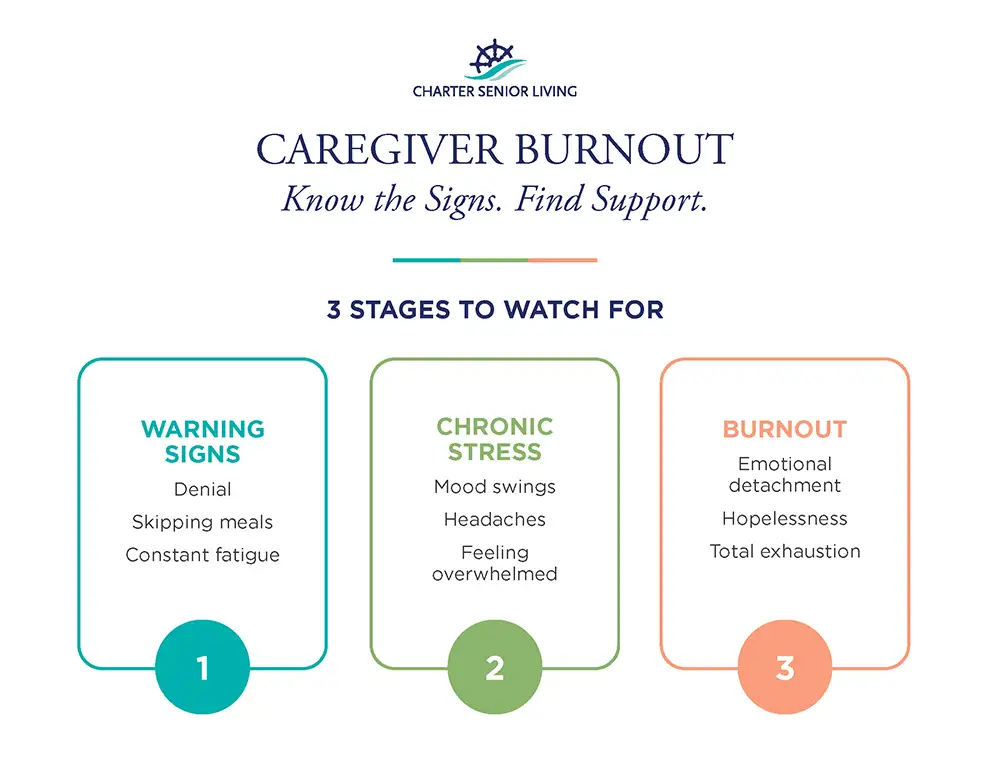Caring for a loved one is a deeply meaningful and selfless role, but it often comes with significant emotional, physical and mental demands. For many caregivers, these pressures can build up over time, leading to what is known as caregiver burnout—a state of chronic stress and exhaustion that can affect your well-being and ability to provide care.
In this blog, we’ll explore the stages of caregiver burnout, helping you recognize the warning signs, understand common symptoms, and learn practical ways to respond and recover. Whether you’re just starting your caregiving journey or are feeling overwhelmed, understanding burnout is key to protecting your health and ensuring the best care for your loved one.
What Is Caregiver Burnout?
Caregiver burnout occurs when the constant demands of caregiving lead to emotional, mental and physical exhaustion. Many caregivers experience intense feelings of stress, guilt and selflessness, often putting their loved ones’ needs above their own for extended periods.
Over time, this imbalance can seriously impact physical health, cause emotional strain and affect personal relationships. Understanding what caregiver burnout is is the first step toward managing it effectively and seeking help when necessary.
What Are the Symptoms of Caregiver Burnout?
Recognizing the symptoms of caregiver burnout can help you identify when stress is becoming more than just temporary fatigue. Common signs include:
-
Chronic fatigue and exhaustion: Feeling tired even after rest and struggling to keep up with daily tasks
-
Mood swings, anxiety or depression: Increased irritability, sadness or emotional numbness
-
Physical ailments: Headaches, digestive issues and other stress-related health problems
-
Withdrawal from social life: Avoiding friends, family and enjoyable activities due to feeling overwhelmed
If these symptoms sound familiar, it’s important to address them early to prevent further health decline.
The Three Stages of Caregiver Burnout
Understanding the stages of caregiver burnout can help you identify where you are in your caregiving journey and take action before burnout worsens. While every experience is different, most caregivers move through a gradual progression of emotional, physical and mental strain.

1. The Warning Stage
This early phase is often overlooked. You may experience high stress, denial and overcommitment, pushing yourself to meet every need while neglecting your own. Skipping meals, losing sleep and ignoring fatigue can become the norm. These red flags may seem minor, but they’re often the first signs that your well-being is at risk.
2. The Chronic Stress Stage
As demands continue, exhaustion becomes more persistent, and emotional strain deepens. You may feel increasingly irritable, overwhelmed or withdrawn, and your physical health can start to suffer with symptoms like headaches, digestive problems or insomnia. Personal time and social connections often take a backseat as caregiving becomes all-consuming.
3. The Burnout Stage
At this point, feelings of hopelessness and emotional detachment are common. Even simple tasks may feel impossible, and you might begin to shut down emotionally. Medical care or professional support may be necessary to help you recover and regain stability.
A major contributor to burnout is selflessness without boundaries—when caregivers give so much of themselves that they have nothing left. Recognizing this pattern is key to protecting your health and providing sustainable care for your loved one.
How To Cope With Caregiver Burnout
Wondering how to cope with caregiver burnout? You’re not alone—and there are practical steps you can take to regain balance, protect your health and continue providing compassionate care.
Here are some effective strategies:
-
Prioritize self-care: Make time for rest, eat nutritious meals, stay hydrated, and include light exercise to support your physical and mental health.
-
Set boundaries: Know your limits. It’s okay to say no, delegate tasks and carve out personal time without guilt.
-
Ask for help: Reach out to family, friends, neighbors or local community services. Even small acts of help can relieve pressure.
-
Join a support group: Talking with others who understand your experience can reduce feelings of isolation and offer encouragement and advice.
-
Seek professional help: If you feel consistently anxious, overwhelmed or depressed, speak with a counselor or health care provider for support.
-
Consider Respite Care: Temporary care services allow you to take a break while ensuring your loved one is safe, supported and well cared for.
Taking care of yourself is not a luxury—it’s a necessity. By prioritizing your own well-being, you’re better prepared to continue supporting the person you love.
When It’s Time to Consider Respite Care or Assisted Living
If burnout symptoms persist or caregiving becomes too difficult to manage alone, it may be time to explore additional support.
Respite Care provides short-term relief, allowing you to rest and recharge while your loved one receives professional, compassionate care in a safe environment. It’s a helpful option for caregivers who need a break without compromising their loved ones’ well-being.
For longer-term needs, Assisted Living offers ongoing support with activities of daily living (ADLs), medication management and personal care—along with social activities and a sense of community.
At Springwood Court, a trusted Charter Senior Living community in Fort Myers, FL, we offer compassionate Assisted Living and Respite Care services designed to support both caregivers and their loved ones. Our caring team is ready to help you find balance, renewal, and peace of mind.
You’re Not Alone—Support Is Here
Caregiver burnout is more common than you might think—and it’s nothing to be ashamed of. Recognizing the signs and taking steps to care for yourself is one of the most important things you can do for both you and your loved one. Whether you’re just beginning to feel overwhelmed or are deep in the challenges of burnout, know that support is within reach.
If you or someone you love is experiencing the effects of caregiver burnout, you’re not alone—and support is available. At Springwood Court, we offer compassionate Assisted Living and Respite Care services designed to ease the caregiving journey.
Let us help you find balance, renewal, and peace of mind. Contact us today to learn more or schedule a visit. We’re here to support you—so you can continue to care for your loved one with confidence—and for yourself, too.






